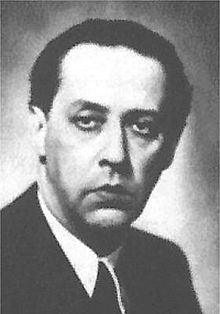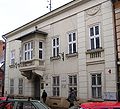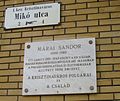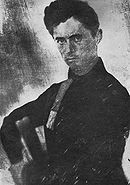- Sándor Márai
-
The native form of this personal name is Márai Sándor. This article uses the Western name order.
Sándor Márai (originally Sándor Károly Henrik Grosschmied de Mára) (April 11, 1900 – February 22, 1989) was a Hungarian writer and journalist.
Contents
Biography
He was born in the city of Kassa in Austria-Hungary (now Košice in Slovakia) to an old family of Saxon origin who had mixed with magyars through the centuries. Through his father he was a relative of the Hungarian noble Ország-family. In his early years, Márai travelled to and lived in Frankfurt, Berlin, and Paris and briefly considered writing in German, but eventually chose his mother language, Hungarian, for his writings. He settled in Krisztinaváros, Budapest, in 1928. In the 1930s, he gained prominence with a precise and clear realist style. He was the first person to write reviews of the work of Kafka.
He wrote very enthusiastically about the Vienna Awards, in which Germany forced Czechoslovakia and Romania to give back part of the territories which Hungary lost in the Treaty of Trianon. Nevertheless, Márai was highly critical of the Nazis as such and was considered "profoundly antifascist," a dangerous position to take in wartime Hungary.
Marai authored forty-six books, mostly novels, and was considered by literary critics to be one of Hungary's most influential representatives of middle class literature between the two world wars. His 1942 book Embers (Hungarian title: A gyertyák csonkig égnek, meaning "The Candles Burn Down to the Stump") expresses a nostalgia for the bygone multi-ethnic, multicultural society of the Austro-Hungarian Empire, reminiscent of the works of Joseph Roth. In 2006 an adaptation of this novel for the stage, written by Christopher Hampton, was performed in London.[1]
He also disliked the Communist regime that seized power after World War II, and left – or was driven away – in 1948. After living for some time in Italy, Márai settled in the city of San Diego, California, in the United States.
He continued to write in his native language, but was not published in English until the mid-1990s. Márai's Memoir of Hungary (1944-1948) provides an interesting glimpse of post World War II Hungary under Soviet occupation.[2] Like other memoirs by Hungarian writers and statesmen, it was first published in the West, because it could not be published in the Hungary of the post-1956 Kádár era. The English version of the memoir was published posthumously in 1996. After his wife died, Márai retreated more and more into isolation. He committed suicide[3] by a gunshot to his head in San Diego in 1989.
Largely forgotten outside of Hungary, his work (consisting of poems, novels, and diaries) has only been recently "rediscovered" and republished in French (starting in 1992), Polish, Catalan, Italian, English, German, Spanish, Portuguese, Czech, Danish, Icelandic, Korean, Dutch, and other languages too, and is now considered to be part of the European Twentieth Century literary canon.
Bibliography
Translated into English
- The Rebels (1930, published in English in 2007), Hungarian title: A zendülők. ISBN 037540757X
- Esther's Inheritance (1939, published in English in 2008), Hungarian title: Eszter hagyatéka. ISBN 1400045002
- Casanova in Bolzano (1940, published in English in 2004), Hungarian title: Vendégjáték Bolzanóban ISBN 0375712968
- Embers (1942, published in English in 2000), Hungarian title: A gyertyák csonkig égnek ISBN 0375707425
- Memoir of Hungary (1971, published in English in 2001), Hungarian title: Föld, föld…! ISBN 9639241105
Gallery
-
Statue of Márai
in Budapest's Mikó utca, Krisztinaváros -
Márai's memorial on his former home in Krisztinaváros
Notes
- ^ Billington, Michael (March 2, 2006). "Embers". Guardian Unlimited. http://arts.guardian.co.uk/reviews/story/0,,1721509,00.html. Retrieved 2007-09-10.
- ^ Johanna Granville, review of Sándor Márai, Memoir of Hungary, (1944-1948), HABSBURG, H-Net Reviews, April 1988.
- ^ "Sándor Márai". Random House. http://www.randomhouse.com/knopf/authors/marai/. Retrieved 3 June 2009.
External links
- See discussion in the Book Club at Words Without Borders – an online magazine for international literature
- Official Marai site at Knopf, which is releasing Marai's novels in English
- Review of Embers
- Marai's American Journal – Excerpts (in English) from Marai's final diaries,
- Sándor Márai Blog – a fan blog with news, reviews, links
- Márai at Hunlit
- János Kőbányai,Sándor Márai: a smoldering within,"Eretz Acheret" Magazine
- 70 Years Later, A New Chance To Read 'Marriage' NPR story about new translation of "Portraits of A Marriage" (with link to excerpt)
Categories:- Hungarian journalists
- Hungarian novelists
- Hungarian writers
- Writers who committed suicide
- People from Košice
- University of Leipzig alumni
- Suicides by firearm in California
- Hungarian-German people
- 1900 births
- 1989 deaths
Wikimedia Foundation. 2010.









